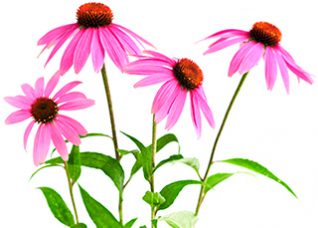
MinerAlert

MinerAlert
Echinacea purpurea
Purple coneflower, Black-eyed Susan, Rudbeckia

Depending on the species used, the roots, leaves or flowers. Although the 3 plant species mentioned before belong to the same botanical genus, they do not all have exactly the same curative properties or contain the same active principles.
Various Echinacea species may be used as tea, capsules, tablets, fluid extracts, tinctures or injections.
Echinacea has been used by various Native American tribes to treat minor wounds, inflammations, skin infections, as well as against insect stings and snakebite. Some of the active principles contained in the medicinal species of Echinacea have the ability to promote immuno-modulatory activity, that is, enhance the body’s defense system. For this reason, it is thought that this plant may be of use to prevent or combat various types of infections, especially those of viral origin. Because of this, Echinacea preparations are being tested against the HIV virus, which causes AIDS, but further research is necessary to prove its effectiveness in HIV patients. In the treatment of herpes infections, for example, Echinacea preparations did not show any significant results, as compared to placebo. Currently, various Echinacea preparations are recommended to combat mild to moderate upper respiratory tract infections, including the common cold. Research done mostly in Europe indicates that Echinacea preparations may be of value in reducing both the severity and the duration of colds, but some scientists believe that a number of the trials were flawed in their methodology and therefore no definite conclusions as to the plant’s efficacy can be made. Various Echinacea products are also touted as a preventive therapy for colds, but no clinical trials support this assumption conclusively.
Safety/Precautions:
Before you decide to take any medicinal herb or herbal supplement, be sure to consult with your health care professional first. Avoid self-diagnosis and self-medication: Always be on the safe side!